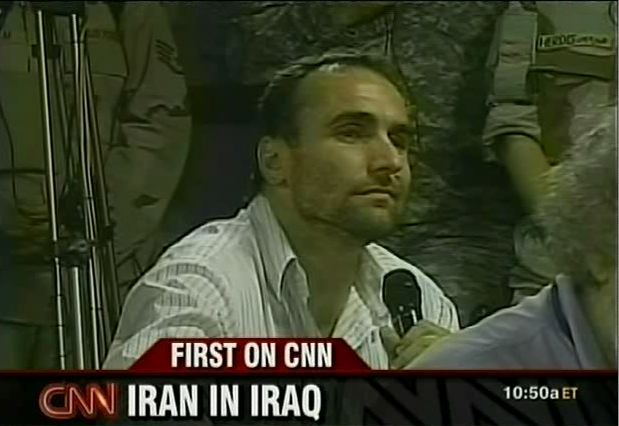NR: Iran puts a bounty on American soldiers in Iraq

Click photo to play
Length: 3:41
TONY HARRIS: Iran's elite Quds Force training attackers in Iraq. You saw the story first on CNN.
Now our Michael Ware reports Iran's involvement may go much higher up the chain of command.
(BEGIN VIDEOTAPE)
MICHAEL WARE, CNN CORRESPONDENT (voice-over): These American soldiers might not know it, but they have a bounty on their heads, according to U.S. military intelligence. A senior U.S. military official tells CNN Iran's Quds Force is offering reward money to Iraqi militia who kill G.I.s. The Quds Force is an elite unit of Iran's Revolutionary Guard.
U.S. officials are unwilling or unable to offer details of the bounty claims, but with Iranian-made bombs tearing into American armor, and plots to kidnap coalition soldiers unfolding, the threat is being taken seriously.
Much clearer, say U.S. officials, is Iran's chain of command. They insist Iran's supreme leader, Ayatollah Ali Khamenei, and other senior Iranians know the Quds Force is involved in killing coalition soldiers.
(on camera): When you say senior leadership in Tehran is aware of the Quds Forces' activity, are you talking about Supreme Leader Ayatollah Khamenei?
BRIG. GEN. KEVIN BERGNER, MULTINATIONAL FORCE, IRAQ SPOKESMAN: I'll leave it at "senior leadership in Iran."
WARE: Put it this way, do you think it's possible he doesn't know?
BERGNER: That would be hard to imagine.
WARE (voice-over): And the Quds appear to have help. CNN broke the story that this man, a Lebanese Hezbollah special operations commander, was arrested inside Iraq by U.S. forces in March. His name: Ali Mussah Daqduq. U.S. officials say he was working with Iranian-backed militia known as the "special groups." The U.S. military says that interrogation of Daqduq and the Iraqis he trained, as well as documents found with them, have provided the most striking evidence yet linking the Quds Force to violence in Iraq.
BERGNER: He was directed by Iranian Quds Force to make trips in and out of Iraq and report on the training and operations of the Iraqi "special groups."
WARE: The U.S. military says Daqduq and the Quds Force helped plan an attempt to kidnap five American soldiers in Karbala on January 20th that ended with their killings. That the Quds funded the "special groups" militia in Iraq with up to $3 million a month, and that the Quds ran three training camps near Tehran, to prepare Iraqi militia recruits for operations against coalition forces. American officials say they have videotaped confessions as well as electronic intelligence -- meaning intercepted communication or satellite imagery -- to corroborate these allegations.
None of this impresses this former consultant to Iran's nuclear negotiating team.
KAVEH AFRASIABI, FMR. CONSULTANT TO IRAN: This latest allegation against Iran by the U.S. military has the potential to derail future U.S./Iran dialogue and Iraq security. Tehran has flatly rejected these allegations against it, and may reevaluate or reassess its express willingness for further talks with the U.S. on Iraq's security.
WARE: The U.S. governments may not have much enthusiasm for such talks anyway.
SEAN MCCORMACK, STATE DEPT. CORRESPONDENT: They say that they want to play a more helpful role in Iraq, that they want to help stabilize Iraq. Well, these kinds of activities serve exactly the opposite purpose.
WARE: The role that Iran wants to play in Iraq might not be one America decides it can live with.
Michael Ware, CNN, Baghdad.
